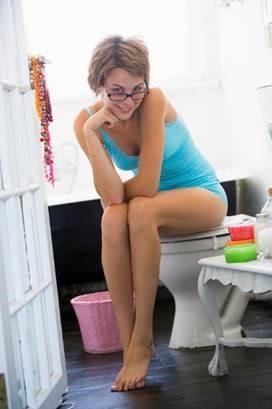If I were to ask you how you use the toilet, you’d likely think I’m a bit strange.
OK, I’ll be more specific. Do you look at what’s in the bowl before you flush it away?
Even though you probably just erupted in laughter, this really is no laughing matter. Your body gives you clues about your state of health through your “number one and number two” so it would behoove you to take a peek on a regular basis.
Here’s what I mean:
Number one: What your urine says about you
There are a few things to look at with your urine—the color, the cloudiness and the odor.
1. The colorYellow/gold: Usually indicates healthy urine. Vitamins might make it brighter (especially B vitamins). Dark gold can mean you’re slightly dehydrated and need to drink more water.
Red: Can indicate blood in the urine, which suggests maybe a kidney stone or urinary tract infection—see a doctor.
Pink: Usually occurs after eating red or purple foods like beets or blueberries. See a doctor if it persists and/or you haven’t been eating foods like these.
Orange: Usually a sign of dehydration, or can be the result of eating orange foods (like carrots) or certain antibiotics. It can also signal a liver or pituitary problem, so see a doctor if it persists or you have other symptoms.
Brown: Can mean extreme dehydration or be the result of eating fava beans. It can also suggest urinary tract infection, kidney stone; kidney tumor, Addison’s disease; protein in the urine or a pituitary problem. See a doctor.
Any other color (black, green, etc.): Unless you’ve recently eaten a lot of green or dark foods or have taken medications or supplements that turn your urine dark (charcoal is a common culprit), see a doctor.
2. Clear or cloudy?Healthy urine is usually clear.
Cloudy urine can mean dehydration, urinary tract infection, kidney problems, metabolic problems or lymph fluid in the urine. See a doctor to rule out any problems.
3. The odorUrine is usually odorless, but if there’s a smell to yours, here are some possibilities behind the smell:
- Certain medications or supplements
- Certain foods — especially asparagus!
- Urinary tract infection
- Uncontrolled diabetes
Consult your doctor if you have concerns, especially if you suspect UTI or diabetes.
Number two: What is your feces trying to tell you?
A normal healthy bowel movement should look like a moist brown banana with a slight point at one end. It should glide out easily with no significant grunting required.
On the other hand, if your stool looks like a bunch of balls all wadded together or rabbit pellets, it's been inside of you way too long. Chances are excellent that you needed to grunt it out and constipation is a regular thing for you.
If your stool has undigested food particles in it on a regular basis (aside from corn kernels), that's a sign that you're low in digestive enzymes.
Same goes for if your turds are floaters. BMs that float suggests poor digestion of fats, which can reflect a gallbladder issue, low bile output or other enzyme challenges.
If your feces is loose or watery, that means it rocketed through the GI tract too quickly and the colon didn’t absorb water like it should. This suggests inadequate digestion and may mean you're not properly absorbing nutrients.
Receive your messages and act accordingly
Now that you’ve gotten a better idea what your commode contents might be trying to tell you, first and foremost, see a doctor if you have concerns.
Once you’ve been assured that there are no major issues, it’s important to keep your body’s “waste excretion efforts” working smoothly.
Here are ways you can make a big difference:
- Nothing helps promote sound digestion like making your meals easier on your system, to begin with! Avoid eating animal proteins and starches together, as this combination is extremely difficult for your body to break down efficiently. Check out Great Taste No Pain if you want guidance and some delicious recipes.
- Drink eight 8-oz. glasses of water a day to avoid dehydration.
- Balance your intestinal flora with a full-spectrum probiotic like Super Shield. Your beneficial gut bacteria help break down certain foods and fiber, so having a proper population of them is crucial for thorough digestion and smooth BMs.
- Supplement with digestive enzymes if necessary. Digestizol Max contains a well-rounded blend of 15 plant-derived enzymes that can give your system a helpful boost.
To your health,
Sherry Brescia












@ Don – Thank you so much for your feedback! We are happy you enjoyed the content!
WHAT A GREAT BREAKDOWN OF A SUBJECT NOT OFTEN ADDRESSES! THIS SHOULD BE HELPFUL TO MANY FOLKS THAT ARE NOT AWARE OF SUCH A SIMPLE ANNALYSIS OF HOPEFULLY AN EVERY DAY
“MOVEMENT” THANK YOU !
@Lynne – We do ship the UK, and the amount of time it takes to arrive is not enough time for the potency to be affected. Thank you for reaching out, have an amazing day!
I am just a bit bothered regarding the posting of Super Shield as I am in the UK. Would they still arrive in good condition as I understand they must be kept refrigerated? Regards, Lynne
@Nancy – Without a full analysis of your current diet and workout regimen, we can’t be sure of what the root cause could be. We do have a “contact us” tab here on the website where you can submit your concerns by email and we can help you with research ideas. We also have a backlog of blogs as well that will give you everything we have on constipation. Below is a link. Thank you so much for reaching out, and have a great day!
http://blog.holisticblends.com/search?q=constipation